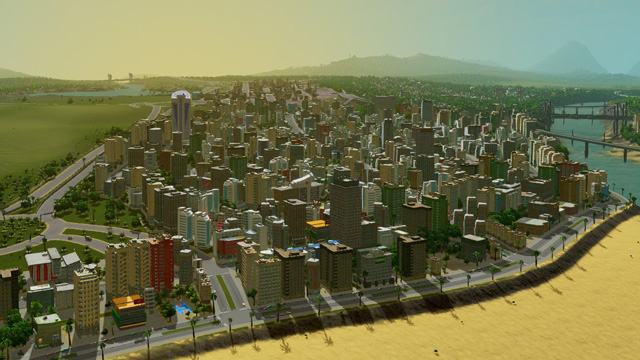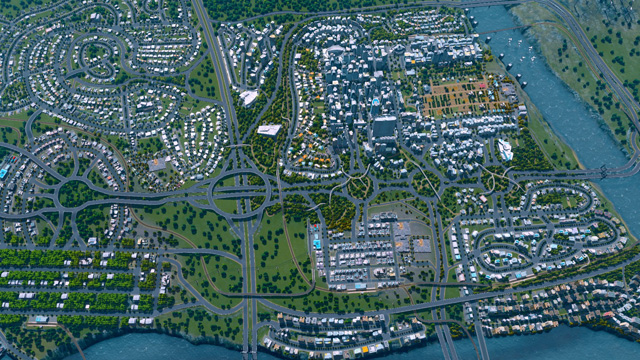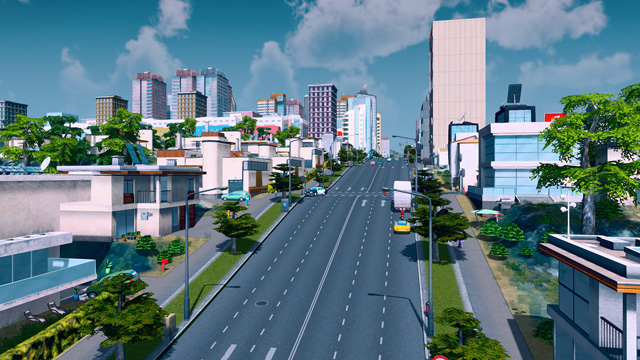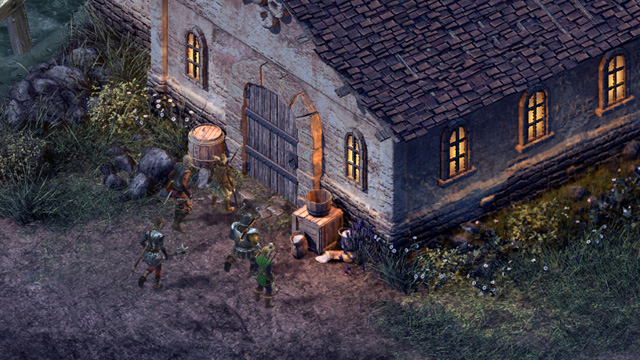
I am astounded by how little I have to do in Cities: Skylines to produce a massive smile on my face. Whether I’m swinging the camera around to get a better view of my newly-placed bridge, adding in a new residential corner or trying to improve gridlock in my downtown core, every aspect of the game feels rewarding and enjoyable. I can occupy myself with small tasks like ensuring my water budget is up to par, or start grand-scale plans to completely eradicate the industrial off-ramp as part of a new highway system. Every action furthers my suspicion that this game will end up in my top ten of the year. It also feels like something I’ve been wanting for a long, long time. Why is that, exactly?
I’ll cut the snarky attitude here; it’s because Cities: Skylines is everything the most recent SimCity isn’t. It’s not obtrusive. It doesn’t require a profile to play. It doesn’t require me to be online. It doesn’t force multiplayer down my throat. I’m not at the mercy of EA’s servers. And, above all, I can buy extra plots of land and build my city to the size of my dreams. I can finally reach back to myself playing SimCity 2000 and relive all the wondrous experiences. I’m not here to bash the creators of SimCity, but praise the developers of Cities: Skylines and other companies who take the time to really listen to customer feedback.
The CEO of Colossal Order, the developer responsible for Cities, said in an interview that Paradox “gave us the green light after they saw what happened with SimCity.” Mariina Hallikainen and the rest of the Colossal Order team are quite candid about their reasons for making Cities: Skylines. As usual, they mostly just wanted to make a great game and do their jobs. But with the response and backlash from the millions of customers who bought SimCity, Colossal Order and Paradox knew they had an opportunity and ran with it. I just spent the last four hours building roads and trying to figure out how my intersections could be improved; it’s a testament to the design and passion that went into this that I didn’t even notice the time melt away.

You could tell demands were heard. A few things weren’t improved, the site was bulldozed and built from the ground up. Fully customizable roads? Done. Mod support? The number of mods is staggering. Dividing your city into districts, allowing for more micromanaging than ever? It’s all here. Did I mention it’s also only $30?
As a consumer of games, I feel like I have very little power. I can talk about voting with my wallet all I want, but I’m only one man and buying seven copies of Chrono Trigger is only going to break my wallet. It can take years, or even decades, for desired titles to emerge, so when a group of dedicated professionals put their livelihoods on the line to make something you really, really want… well, you can’t help but appreciate their efforts.
It’s hard to make your voice heard. Companies have bottom lines to worry about; they certainly can’t be blamed for ignoring a small (but vocal) group of enthusiasts who swear on their lives that “Game X” should be made this way, instead of that way, because of some obvious connection to an older game. They do have to listen, and have an idea of what’s trending in the gaming world, but with so many voices, which should be listened to? You can hardly blame them for not pleasing everybody.

Look, we don’t often get what we want in life. It’s very hard and most companies will always put the bottom line first and consumer appeasement second (or third). In Victoria, my Internet service provider just jacked up the rates for the same speed. The same speed! How gracious! It’s ridiculous that I should expect one of the richest countries in the world to have one of the best Internet services in the world, but hey, I’m an optimist. The fact that the McKenzie overpass doesn’t exist is yet another local example of how corporate entities (or in this case, a government branch) won’t listen to what people are complaining about. I mean, if it’s so obvious to me that means it’s obvious to others and obviously obvious to the people in charge, right? Right? Hello!? Is anybody listening to me?
OK, so I can’t make Shaw a better ISP. I can’t force the government to build an overpass onto the highway. But I can vote with my wallet, and the recent critical and commercial success of Pillars of Eternity has really piqued my interest. Not for the product itself, but how the very creation of the game came from 77,000 individual donors on Kickstarter.
I loved the idea of Kickstarter right away. I took it for what it was: A charitable donation, with the possibility of something tangible. A shot in the dark. There’s no guarantee it will work, but it’s worth a try. Hey, what’s five or ten bucks anyway? But it comes down to companies listening. Obsidian Entertainment and Paradox Interactive wanted to make a computer RPG reminiscent of Icewind Dale and Baldur’s Gate. It’s a unique genre, despite RPGs being all the rage at the moment. It’s not Skyrim, it’s not Mass Effect and it’s not Final Fantasy.

Besides, that’s not what these 77,000 fans wanted. They wanted a sequel to Baldur’s Gate. They wanted an old-school computer RPG, with great writing, familiar gameplay and a new story so they could relive their nostalgic glee while being challenged by modern game mechanics. The people spoke, the creators listened. The Kickstarter campaign raised over a million dollars in just 24 hours and ended with nearly four million. Politicians and high school football teams can only dream of this kind of fundraising power. This isn’t the invention of the telephone itself, but it’s such a fundamental leap it almost could be called revolutionary.
What other Kickstarter projects are we going to see? Forget trends or projected sales. Why not put a campaign out there and give the fans a chance to show that they want a certain passion project made into a reality? It matters so much because it affirms our passions. It strengthens our emotional rants online about how amazing an updated version of a long-forgotten franchise would be. It legitimizes our memories. It validates our hobby, and our cries of woe. Of course we knew how much fun an updated, non-invasive city-building game would be. EA, didn’t you listen? Weren’t you paying attention?
It didn’t. But somebody did and with over half a million copies of Cities: Skylines sold in less than a month, that understanding has created a two-way road of major benefits.



















